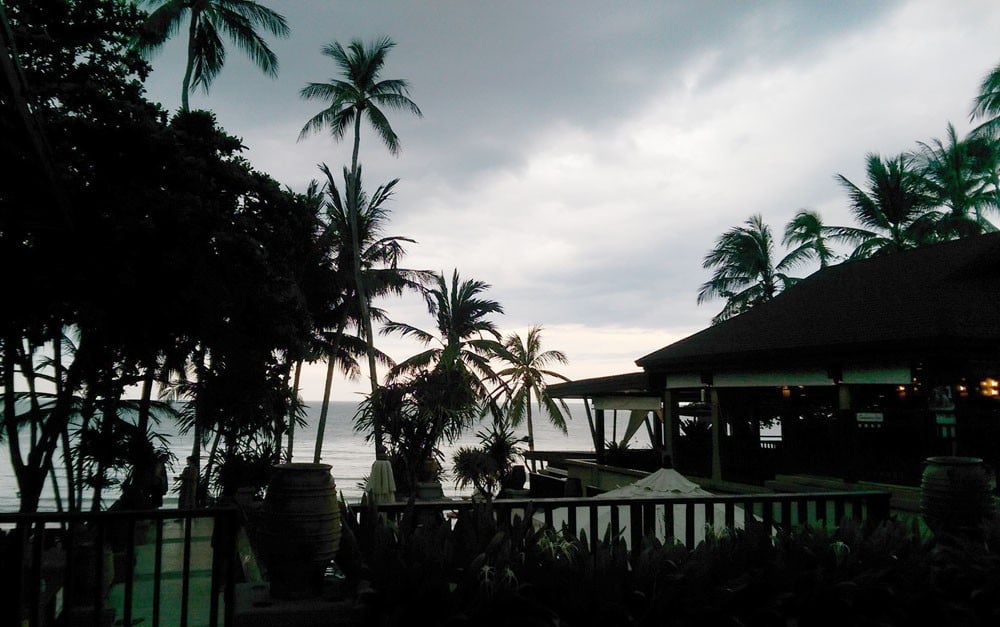
Slowly, the island’s lack of pace gets to me. I stop asking for free wifi and wondering about my email

"Excuse me, do you have wifi?"
It’s a balmy evening in Koh Samui, Thailand, one of three eastern islands on the southern coast of the kingdom that are considered amongst the most picturesque in the world.
And here I am, looking to connect, to the social, digital, intangible world.
Sorry mate, no wifi here, comes the reply. We’re sitting on bar stools overlooking the ocean. Tall palm trees break the otherwise unobstructed view of the water. The owner comes around for a small chat. His name is John, in his mid-40s from Sydney, Australia, now permanently residing on this lovely Thai island. "This was always the plan mate," he tells me, "make enough money to move here and open a restaurant. I’m living the dream".
John is not alone. A very large number of former suit wearing, backstabbing corporators from across the globe have thrown in the towel and jumped ship, landing up in places like Koh Samui and Koh Tao in Thailand, and Boracay and Palawan in the Philippines.
The key takeaway from conversations with a bunch of these guys was simply this: we had enough of the fast life, the deadlines and the mind games. Here on the islands, life is slow. Real slow.
The idea of a slower laid back life doesn’t quite fit with not having wifi so I probe further. "Yeah, sure I do Facebook, it’s more to promote the restaurant, and email, yeah, I email my parents once a week or something". But then John suddenly remembers something terribly important. "Oh but I do have a cell phone." He proudly props up a sturdy little dumb phone, the kind that makes calls, sends messages, and has a great battery life. "If somebody really wants to get in touch with me, they’ll call".
We part ways shortly after. And soon enough, it’s another postcard morning on the Island. As we sit on the terrace (again, overlooking the ocean), dark clouds appear on the horizon, a classic Thai cloudburst is imminent. I instantly reach for my Smartphone, "that’s just begging for instagram," I think to myself. But unfortunately, I still haven’t found wifi.
And then it hits me. What is this need to project every insignificant moment of my existence, in almost real time, on a multitude of platforms to a grossly inflated audience, most of whom don’t even matter in the scheme of things? After all, if it’s a matter of chronicling, then by all means, click away, but if everything has become a Facebook update, a hash tag and a trend, then obviously, something has gone terribly amiss.
But I don’t have time to think of all this. My mind, deprived of its constant dose of technology and social media, has finally entered the panic zone. I think of my family and friends, of my house and the pet, I wonder if everything is as it were when I left, I wonder if people even remember me, after all, it’s been a whole 48 hours.
"You need to relax brother, nothing has happened," says Alexis, a young Italian in a lovely oversized white linen shirt and a creamy panama hat.
Now the owner of a quaint little pizza house in the fisherman’s wharf area of the island, Alexis founded and ran a software house in Rome for a decade. "I used to get over a hundred emails a day, I couldn’t have a conversation without being interrupted ten times, my social and private lives both went down the drain, all because of this constant connection." He cut loose shortly after. "It was hell, the first few days, but like quitting smoking, nothing happened when I actually disconnected."
And this, I’m told, is the key to disconnecting. Blindly accepting that when the signals go off, life will carry on. Within and without.
Ever since the advent of social media platforms, from Orkut onwards to the plethora today, coupled with the mass affordability of souped up smart phones that can do everything apart from washing the dishes (when I was a child, my mother used to remind me to drink enough water, now an application does that), most of us are in a constant state of connection or interruption. Depends how you look at it.
I am advised to join the next morning’s meditation session on the beach front. Since I’m skeptical of any outdoor activity that doesn’t involve either a racquet or a team and scores, I decide to go and see what all the fuss is about.
As the master trainer explains the meditation exercises, I interject, "what happens next?"
And he replies, "nothing happens". And that in itself, in that moment, is everything.
Slowly, the island’s lack of pace gets to me. I stop asking for free wifi and wondering about my email. I tell myself that I am none the poorer if I’ve missed a few Facebook posts about lunches, fashion shows and amateur photography, or if I couldn’t be a part of a silly tweetathon. I make one phone call home to find out if everyone is still alive and if my house has been robbed. With that out of the way, and for a very brief moment, life unwinds.
Nothing really changes.
Some argue that being connected is a business requirement or something that comes with the trade. For example, a journalist needs to be plugged in, all the time, to stay in the game. But as a former senior executive of a German surgical company told me "I don’t know how you guys survive, we only had phones, letters and telegrams, we worked harder, made better friends, played more golf, and probably had a lot more fun than you miserable lots."
He’s probably right.